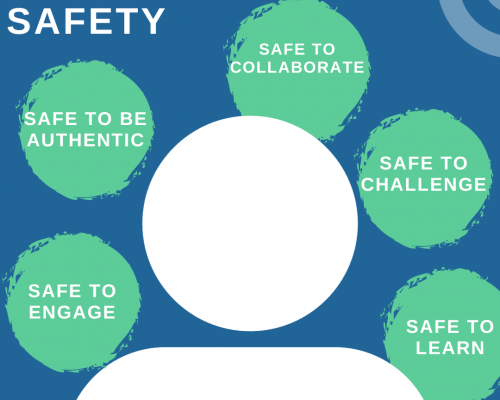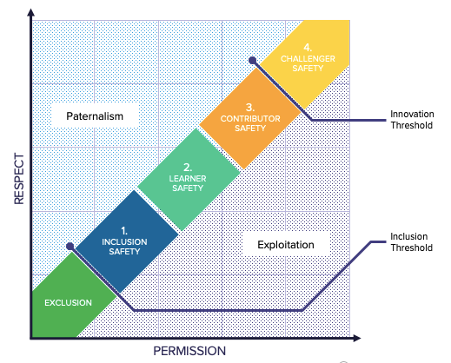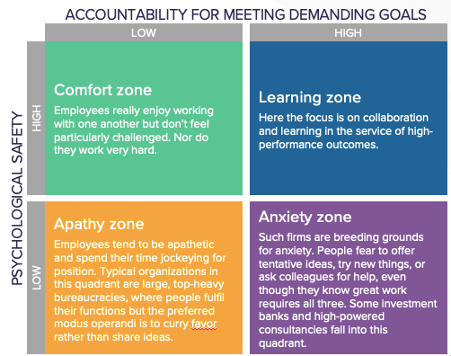Psychological Safety: What is it, why is it important and how can you promote it?

Psychological safety is an essential element that supports the bedrock of high-performing teams. It refers to an individual’s perception of the consequences of taking interpersonal risks. The concept gained prominence through the work of Amy Edmondson (1999), a professor at Harvard Business School, who found that psychological safety enables a culture where colleagues feel comfortable expressing themselves without fear of retribution.
McKinsey’s (2021) recent research corroborates this, suggesting that psychological safety hinges on the behaviours of leaders at all levels within an organisation. A positive team climate, where contributions are valued and well-being is prioritised, stands as the most important driver of psychological safety.
Clark (2020) outlines four stages of psychological safety: Inclusion Safety, where individuals feel accepted; Learner Safety, which allows individuals to engage in the learning process; Contributor Safety, where they contribute value; and Challenger Safety, empowering them to challenge the status quo without fear of retribution. The four stages of psychological safety can be used to assess the stage of psychological safety in your teams and organisation.

(Clark, 2020)
The workplace can be categorised into four quadrants based on psychological safety and performance standards (Edmondson, 2019). Low levels in both create an “apathy zone” with minimal engagement; high psychological safety but low-performance standards lead to a “comfort zone” where there’s little challenge or innovation. Conversely, high-performance demands paired with low psychological safety mark an “anxiety zone,” stifling communication and risking performance. The ideal “learning zone” features high standards and psychological safety, fostering an environment ripe for collaboration, learning, and high performance.

(Edmondson, 2019)
Further underpinning the importance of psychological safety, a study by Google, known as Project Aristotle, found that psychological safety was the most important factor that set successful teams apart from others. The research concluded that individuals on teams with higher psychological safety are less likely to leave Google, they’re more likely to harness the power of diverse ideas from their teammates, they bring in more revenue, and they’re rated as effective twice as often by executives (Rozovsky, 2015).
Creating a psychologically safe workplace involves active participation and commitment from leadership. Leaders must encourage team members to speak up, show vulnerability themselves, and endorse a learning-oriented approach rather than a performance-oriented one. Acknowledging one’s fallibility as a leader can set a precedent that mistakes are not only accepted but are seen as a natural part of the learning process.
So how do you effectively build psychological safety?
Organisations must take intentional steps. This includes:
- Opening meetings with agenda items that allow all voices to be heard,
- Celebrating diverse opinions,
- Actively responding to team contributions with appreciation and follow-up, can reinforce a culture of mutual respect and continuous improvement,
- Committing to being open about failures, and understanding errors are an opportunity for development and learning.
The direct link between psychological safety and team success presents a compelling argument for organisations to prioritise and cultivate such environments. Ensuring teams are high-performing not only enhances current productivity but also sets the stage for sustained success and innovation.
Reference List
Clark, T.R., 2020. The 4 Stages of Psychological Safety: Defining the Path to Inclusion and Innovation.
Edmondson, A., 1999. Psychological Safety and Learning Behavior in Work Teams. Administrative Science Quarterly, 44(2), pp.350-383.
Edmondson, A., 2019. The Fearless Organization: Creating Psychological Safety in the Workplace for Learning, Innovation, and Growth. Wiley.
McKinsey & Company. (2021). Psychological safety and leadership development.
Rozovsky, J. (2015). The five keys to a successful Google team.
SHARE: